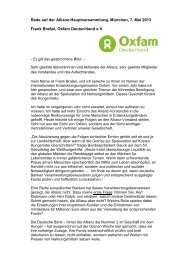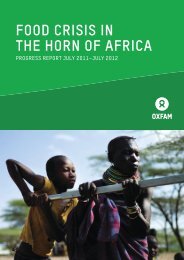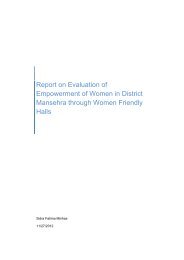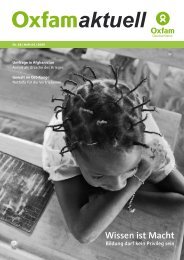shape - Oxfam
shape - Oxfam
shape - Oxfam
You also want an ePaper? Increase the reach of your titles
YUMPU automatically turns print PDFs into web optimized ePapers that Google loves.
INTRODUCTION<br />
Sustainability, Hope, Action, Prevention, Education (SHAPE)<br />
Zimbabwe Trust is a university-based organisation that offers<br />
HIV prevention programs to university students in Zimbabwe.<br />
ABOVE: SHAPE gender activists, from left, Lawrence, Salome and Tafara discuss gender issues before heading<br />
out to speak with other students on campus. Photo: William Nyamuchengwa/<strong>Oxfam</strong>AUS.<br />
Contents<br />
Executive summary 3<br />
Established in 2000, the<br />
organisation operates in four<br />
state universities and has a<br />
combined student membership<br />
of about 1,000.<br />
This case study documents<br />
SHAPE’s experiences in<br />
implementing its Gender,<br />
Masculinities and HIV project<br />
at the Midlands State University<br />
(MSU) in Gweru. The project,<br />
which attempts to improve gender<br />
relations between male and<br />
female students and influence<br />
their sexual behaviour, is funded<br />
by <strong>Oxfam</strong> Australia through<br />
the Combined <strong>Oxfam</strong><br />
Gender and HIV and AIDS<br />
(COGENHA) program.<br />
This project has been<br />
selected as a case study for its<br />
innovative approach to behaviour<br />
change strategies with young<br />
people. Aspects of the SHAPE<br />
project that will be explored<br />
in this study include:<br />
• the process by which this<br />
project has been established<br />
and the involvement of<br />
university students in its<br />
design, implementation<br />
and evaluation;<br />
• ways in which female and<br />
male student behaviour<br />
changed as a result of the<br />
intervention messages; and<br />
• learnings that can be<br />
drawn from the SHAPE<br />
experience with regards to<br />
HIV programming for youth.<br />
<strong>Oxfam</strong> supports this project<br />
because of its good practice<br />
model for HIV programming which<br />
is innovative, participant-driven<br />
and systematic and which targets<br />
the transformation of inequitable<br />
gender relations as a core strategy<br />
to prevent HIV. It is hoped that<br />
other organisations and individuals<br />
working in the area of young<br />
people and HIV will find the<br />
SHAPE experience informative and<br />
useful for their own work.<br />
Young people and HIV in Zimbabwe 5<br />
HIV and university students 7<br />
SHAPE Zimbabwe Trust 8<br />
SHAPE at Midlands State University 10<br />
The Gender, Masculinities and HIV project 12<br />
Defining features of SHAPE’s intervention 23<br />
Challenges that remain 26<br />
The way ahead 29<br />
Conclusions 30<br />
FRONT COVER: SHAPE peer<br />
educator and gender activist<br />
Willard Barure is studying<br />
second-year marketing<br />
at Midlands State University<br />
in Gweru, Zimbabwe.<br />
Photo: William Nyamuchengwa/<br />
<strong>Oxfam</strong>AUS.<br />
In the Gender, Masculinities<br />
and HIV project, SHAPE takes<br />
a very strong gender stance,<br />
arguing that inequitable gender<br />
relations need to be transformed<br />
in order to effectively respond to<br />
the HIV epidemic. Unlike other<br />
gender programs that focus<br />
solely on empowering women,<br />
the SHAPE approach also<br />
targets men for change. It is this<br />
male component which is unique<br />
about SHAPE’s intervention and<br />
which forms the basis of this<br />
case study.<br />
RIGHT: Photo: Robert McKechnie/<strong>Oxfam</strong>AUS.<br />
COGENHA<br />
The Combined <strong>Oxfam</strong> Gender and HIV and<br />
AIDS Program (COGENHA) based in Harare,<br />
Zimbabwe, supports community-based and<br />
non-government organisations that are<br />
responding to the HIV and AIDS epidemics.<br />
COGENHA provides funding and technical<br />
support to organisations that focus on:<br />
• reducing the risk of young people and<br />
women to HIV infection by promoting<br />
sexual behaviour change and improving<br />
gender equity; and<br />
• Improving integrated care and support<br />
services for people living with HIV and<br />
AIDS and their carers.<br />
2 3


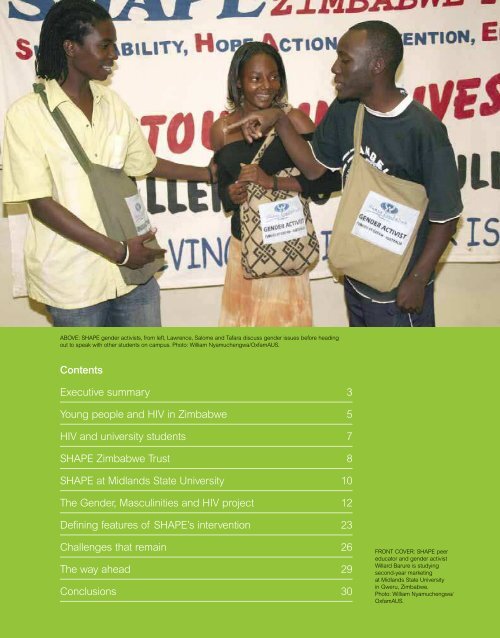


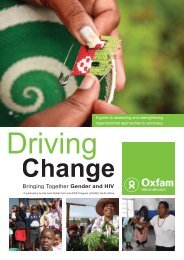
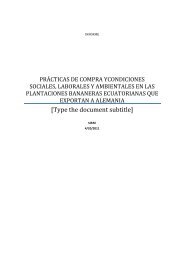
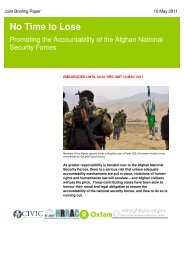
![Download: Faltposter EU-Handelspolitik [PDF 2,17MB] - Germanwatch](https://img.yumpu.com/25095854/1/190x161/download-faltposter-eu-handelspolitik-pdf-217mb-germanwatch.jpg?quality=85)
